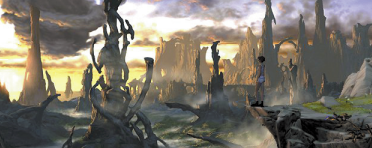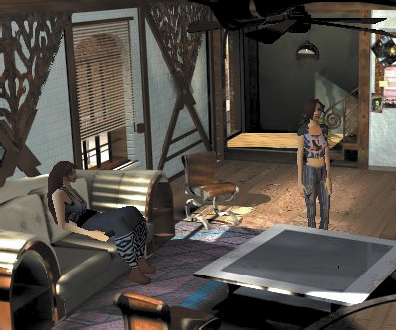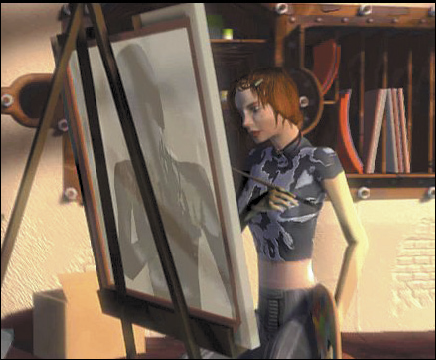A Stark Contrast To Arcade-ia
by John Walker on Mar.18, 2006, under The Rest
In response to Stu’s excellent new feature on Grid Wars 2, I post this piece (formerly printed in PC Gamer). I’m specifically addressing this statement:
“The fact is, in the week or so your correspondent’s been playing Grid Wars 2, its abstract forms and events have been firing ideas and observations and thoughts into his head almost as much as they’ve been firing pretend laser blasts at geometric shapes, and this feature can only brush fleetingly across the surface of most of them lest it end up 20,000 words long. Not many books provide such mental stimulation, and certainly not a single “narrative-led” computer game ever has.”
This piece goes half way to capturing the significance of TLJ for me, and the extent of its influence. It’s also the longer version that was not run in the magazine, and hence has not been massaged by the word-headling hands of Tony Ellis.
The Longest Journey

“Mystery is important. To know everything, to know the whole truth, is dull. There is no magic in that. Magic is not knowing, magic is wondering about what and how and where.”
The Longest Journey almost vanished away unnoticed, another obscurity ranted about by a few, but never reaching any acclaim. In the mire of millennial adventure gaming, it could so easily have been drowned by the density of its peers, ignored by pessimism, never given the chance it so strongly deserved. How it was joyously liberated from this fate is mysterious. And in mystery, there is magic. In The Longest Journey, there is magic.
As a point and click adventure, TLJ already defied conventions, ignoring the genre’s desperately floundering attempts at ‘catching up’. Developer Ragnar Tørnquist and Funcom understood that ‘catching up’ was meaningless – they had a story to tell, and a world in which it needed to be told, and so this was the game they made. The natural instinct to say how it recaptured the adventure’s previous glory is strong, but this just simply isn’t true. Adventure gaming had never been as glorious as The Longest Journey – it hadn’t ever even come close.

Eighteen year old art student April Ryan provides the most perfect eyes through which to witness this tale. Sceptical, sarcastic and sassy, she tight-rope walks the same line as Buffy, never quite tumbling into the annoying. And yet still somehow gets away with normally grating Ameriteenisms such as, “That’s SO not appropriate.” You forgive her, because you realise, as do the games’ twin worlds of Stark and Arcadia, that she’s important.
Tony Ellis was recently explaining to me how Silent Hill 4 manages to spook so effectively by blurring the two worlds of the normal, and the horrific. When an element of one leaks into the other, stability in the known is shaken, and fear drip, drip, drips in. In April Ryan’s life, it is the fantastic that begins to disturb the normality of her existence, the world of dreams invading the world of rationale and science. And as a good horror shows you fear in the every day, The Longest Journey shows you magic. Set 200 years in the future, April’s world is enough like our own to allow us to identify, but distant enough to allow its status as a metaphor.
The meta-narrative tells of how, long ago, the united Earth was divided into two: Science and Magic, Stark and Arcadia. The Bladerunner-inspired future version of our world allows the effects of this severance to have been demonstrated even more starkly than they are now in 2004. Wars have increased global apartheid, Capitalism’s punishments are more prevalent, and people get on with being people as it happens around them. It is unavoidably our future.
In contrast, Arcadia refers back to so many fantasy lands, simplicity bolstered by magic, thus creating seismic instability and inevitable fracture. But Arcadia at least possesses hope. Stark’s worldview is blind, eyes gouged out by its people’s own hands. It allows the coming destruction of Chaos without even the consciousness to question. And so it is through April’s dreams, through her powerful imagination, that she is drawn to ‘shift’ out of that world, and to learn her part in the shaping of the future.

I was unaware of how much I’ve been influenced by The Longest Journey, until returning to its tale for this piece. I’ve been writing a children’s story, on and off, for a couple of years, never getting very far with it, but always driven to persist by its unstoppable urge to leave my head. I’m now wondering how much I have to remove because I’ve simply plagiarised it from my subconscious. The ideology of this game is lodged deeply inside me, partly because I so strongly identified with the message I took from it, and partly because that message is so powerfully told. It is always a point and click adventure. There are always daft clicking the rubber duck on the clamp and tying it to the string puzzles. And it works with these elements, not despite them. Not every voice is perfectly cast, but most are. Yes, there is swearing, but there is swearing where real people swear. And oh wow, are the conversations long. But they are telling you a story like no other.
The opening quote, said to April by her mentor when she is pestering him for answers, speaks for the whole game. The Longest Journey is epic and magnificent, but completion makes you aware that this is only a tiny fraction of a created world. Indeed, these are only weeks in the whole of April Ryan’s lifetime. So much remains unknown. But to know the whole truth is dull. Magic is in not knowing, magic is wondering about what and how and when.
March 18th, 2006 on 20:41
I bought this from Ebay..ooh….about 6 months ago and, lo and behold, never got round to playing it. I shall dust it off post-haste.
March 19th, 2006 on 13:49
I think this article really captured for me what I love so much about The Longest Journey, the whole experience was perfect for me, comparable to some of the great novels.
March 28th, 2006 on 12:33
Damn, can’t read any of that until I’ve played the game.
Sadly I was put off originally, as I thought it was an adaptation of that horrible Disney film about talking dogs trekking across the wilderness.
April 26th, 2006 on 16:29
Hiya! I got here from your link at Ragnar’s (the TLJ god) semi-blog, and I’m glad you posted that link. Cause this is a nice piece of writing! Geesh.. wish I could grasp the cryptic/symbolic parts of games like TLJ :/
Keep up the good work!